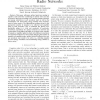Free Online Productivity Tools
i2Speak
i2Symbol
i2OCR
iTex2Img
iWeb2Print
iWeb2Shot
i2Type
iPdf2Split
iPdf2Merge
i2Bopomofo
i2Arabic
i2Style
i2Image
i2PDF
iLatex2Rtf
Sci2ools
CISS
2010
IEEE
2010
IEEE
Cost constrained spectrum sensing in cognitive radio networks
—This paper addresses optimal spectrum sensing in cognitive radio networks considering its system level cost that accounts for the local processing cost of sensing (sample collection and energy calculation at each secondary user) as well as the transmission cost (forwarding energy statistic from secondary users to fusion center). The optimization problem solves for the appropriate number of samples to be collected and amplifier gains at each secondary user to minimize the global error probability subject to a total cost constraint. In particular, closed-form expressions for optimal solutions are derived and a generalized water-filling algorithm is proposed when number of samples or amplifier gains are fixed and additional constraints are imposed. Furthermore, when jointly designing the number of samples and amplifier gains, optimal solution indicates that only one secondary user needs to be active, i.e., collecting samples for local energy calculation and transmitting energy sta...
| Added | 23 Aug 2011 |
| Updated | 23 Aug 2011 |
| Type | Journal |
| Year | 2010 |
| Where | CISS |
| Authors | Gang Xiong, Shalinee Kishore, Aylin Yener |
Comments (0)

